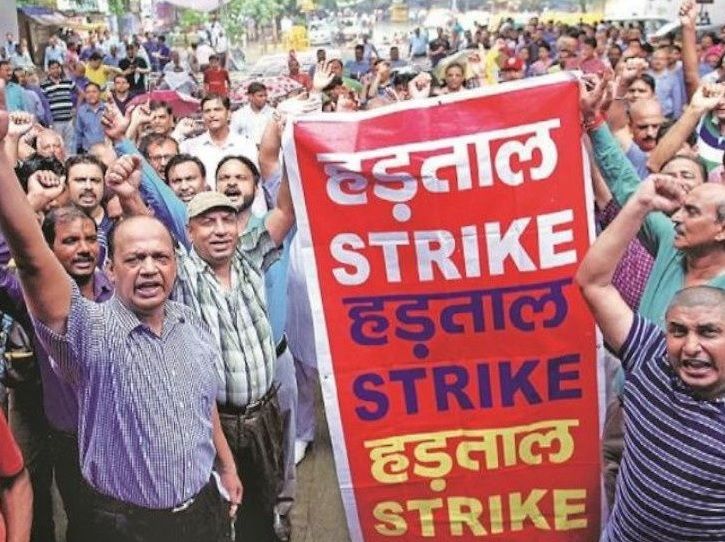Under the aegis of 10 central trade unions, nearly 200 million employees across India will strike work on November 26, protesting the policies of the central government, notably privatisation and the agri laws. This general strike will see government employees across the hierarchy, be it officers or Class IV employees, take part.
Several state-level unions too have decided to join this call. Among the sectors taking part in the strike are banking, roadways, railways, telecom (BSNL), insurance (LIC), post, water and power supply, besides ASHA workers, anganwadi workers and mid-day meal workers. Many farmers’ organisations are also supporting this strike.
The participation of both the organised as well as unorganised sector in the strike is expected to bring the nation to a complete halt. “Due to the anti-labour policies of the central government, employees across the country have been forced to go on strike,” Sanjay Kumar Singh, general secretary of the Indian National Trade Union Congress, told Gaon Connection from New Delhi.
“The government wishes to hand over the functioning of the country’s banks, railways and roadways to private hands. Despite protests and demonstrations by trade unions, it has turned a deaf ear. We shall now fight to the finish,” he added.
The union leader said that every class of employee was upset with the anti-labour politics of the government, and that is why no employee organisation has been left out of the strike. “The involvement of farmers has strengthened the strike. So, it will not merely be another Bharat Bandh but a Mahabandh (absolute strike),” Kumar warned.
Earlier, the central trade unions of the country met in October to deliberate upon the strike. The conference was attended by Indian National Trade Union Congress, All India Trade Union Congress, Hind Mazdoor Sabha, Centre of Indian Trade Union, All India United Trade Union Centre, Self-Employment Women’s Association, Trade Union Coordination Centre, All India Central Council of Trade Unions, Labour Progressive Federation and United Trade Union Congress, besides independent federations and associations.
Among the triggers for the November 26 strike are privatisation of government departments, new labour laws, abolishment of trade union rights, non-implementation of a new pension scheme for employees as well as the three new agricultural laws that have met with widespread protests among a section of farmers.
“This strike is only a beginning,” Sanjeev Reddy, president of the Indian National Trade Union Congress, told Gaon Connection. “We are also trying to create awareness among the common people about the possible outcomes of the new labour laws and privatisation. Because, if the government overlooks our genuine demands, people may have to suffer the consequences in the future,” he said.
Both regular and contractual employees working in the government will go on strike, said Ram Sagar, convener of the All India Trade Union Congress. “Defying hierarchy, everyone is coming together to question the government. Employees of bottling plants and a number of mining trade unions have also decided to join us. About 20 crore [200 million] employees will protest. We hope the voices of employees from every part of the country are audible to the government,” he added.
The long walk to Delhi
Meanwhile, farmers’ demonstrations against the three new farm laws continue unabated. They will embark on a Dilli Chalo! (Walk to Delhi) march on November 26.
The three new laws are: The Farmers’ Produce Trade and Commerce (Promotion and Facilitation) Act, 2020; The Farmers (Empowerment and Protection) Agreement of Price Assurance and Farm Services Act, 2020; and The Essential Commodities (Amendment) Act, 2020.
The All India Farmers Coordination Committee, Rashtriya Kisan Mahasangh and Bharatiya Kisan Sangh have come under the umbrella Samyukt Kisan Morcha, along with several organisations, to protest the laws. During Dilli Chalo!, members will stage a sit-in protest against the policies of the central government.


















